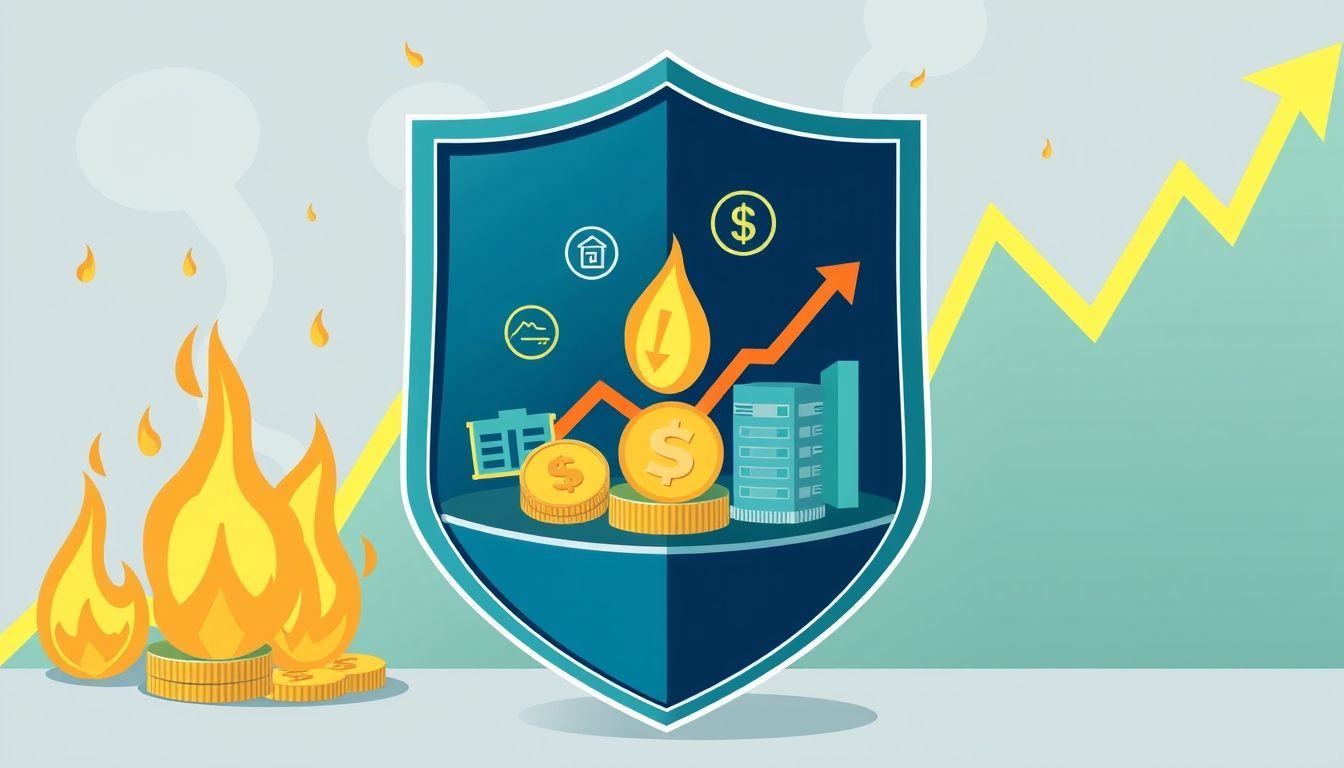Smart Financial Planning in the Age of Inflation: Strategies to Protect Your Savings and Grow Your Wealth
Inflation, that hidden enemy that gnaws at the value of our money, poses a significant challenge to individuals and families alike. In this volatile era, smart financial planning becomes an absolute necessity to protect your savings and grow your wealth. It's not just about surviving financially, but about thriving and achieving your long-term financial goals.
Chapter 1: Understanding Inflation and Its Impact on Your Finances
What is Inflation?
Inflation is simply a sustained increase in the general level of prices for goods and services in an economy. This means that each unit of currency (such as the Saudi Riyal or the US Dollar) buys fewer goods and services over time. Inflation is typically measured using the Consumer Price Index (CPI), which tracks the prices of a basket of goods and services consumed by households.
How Does Inflation Affect Your Finances?
- Decreased Purchasing Power: This is the most obvious effect. As prices rise, you can buy fewer goods and services with the same amount of money.
- Erosion of Savings Value: If your savings are in low-interest savings accounts, the interest may not exceed the inflation rate, meaning that the value of your savings erodes over time.
- Higher Cost of Living: Individuals and families are forced to spend more money to cover basic needs such as food, housing, and transportation.
- Impact on Investments: Inflation can affect the prices of various assets, such as stocks, bonds, and real estate.
Chapter 2: Assessing Your Current Financial Situation
Analyzing Income and Expenses
The first step in smart financial planning is to understand your current financial situation. Analyze your income and expenses carefully. Use a spreadsheet or app to track your spending and identify areas where you can reduce expenses.
Calculating Net Worth
Net worth is the difference between your assets (such as cash, investments, and real estate) and your liabilities (such as debts and loans). Calculating net worth gives you a clear picture of your financial standing and helps you set realistic goals.
Evaluating Financial Goals
What are your financial goals? Do you want to buy a house, save for retirement, or finance your children's education? Define your goals clearly and set a timeline for achieving them.
Chapter 3: Building an Effective Budget to Combat Inflation
Prioritizing Needs
In an era of inflation, prioritizing needs becomes crucial. Focus on meeting basic needs first, then allocate funds to important financial goals.
Reducing Unnecessary Expenses
Look for ways to reduce unnecessary expenses. Can you reduce your streaming service subscriptions, eat out less often, or reduce energy consumption? Every small saving contributes to achieving your financial goals.
Increasing Income
If possible, look for ways to increase your income. Can you get a part-time job, freelance, or invest your skills in side projects?
Chapter 4: Investment Strategies in the Age of Inflation
Diversifying Your Investment Portfolio
Diversification is key to reducing risk in any investment environment, especially in an era of inflation. Spread your investments across a variety of assets, such as stocks, bonds, real estate, and commodities.
Investing in Stocks
Historically, stocks have proven to be an effective way to outpace inflation in the long run. However, you should be aware of the risks associated with stocks and only invest in companies you understand.
Investing in Treasury Inflation-Protected Securities (TIPS)
Treasury Inflation-Protected Securities (TIPS) are a type of government bond that protects investors from inflation. The value of these bonds is adjusted regularly to reflect changes in the Consumer Price Index.
Investing in Real Estate
Real estate is considered a good investment in an era of inflation, as real estate prices tend to rise along with overall price increases. In addition, real estate can provide a steady rental income.
Investing in Commodities
Commodities, such as gold, oil, and metals, are considered a safe haven in times of inflation. Commodity prices often rise when inflation rises.
Chapter 5: Managing Debt Under Inflation
Paying Off High-Interest Debt
If you have high-interest debt, such as credit card debt, it's best to pay it off as quickly as possible. Interest can accumulate quickly in an era of inflation, making it difficult to get rid of debt.
Avoiding Unnecessary Debt
Try to avoid unnecessary debt as much as possible. If you need to borrow money, compare different loan offers and choose the loan that offers the best terms.
Refinancing Your Mortgage
If you have a mortgage, it may be worthwhile to refinance it to get a lower interest rate. This can save you money in the long run.
Chapter 6: Planning for Retirement in the Age of Inflation
Increasing Retirement Contributions
If possible, increase your contributions to your retirement plans. This will help you build a larger retirement fund that can withstand inflation.
Investing in Growth Assets
Invest a portion of your retirement fund in growth assets, such as stocks, which have the potential to generate returns that outpace inflation in the long run.
Delaying Retirement If Necessary
If you are concerned about the impact of inflation on your retirement savings, you may need to delay retirement for a few years.
Chapter 7: Protecting Your Cash Savings from Inflation
High-Yield Savings Accounts
Look for high-yield savings accounts that offer interest rates above the average. This will help you maintain the value of your cash savings.
Certificates of Deposit (CDs)
Certificates of Deposit (CDs) are a type of savings account that offers a fixed interest rate for a specified period of time. CDs can be a good option if you are looking for a safe way to maintain the value of your cash savings.
Money Market Funds
Money market funds are a type of mutual fund that invests in short-term, fixed-income securities. Money market funds can be a good option if you are looking for a liquid way to maintain the value of your cash savings.
Chapter 8: Negotiating Salaries and Prices
Negotiating Salary Increases
When inflation rises, it is important to negotiate salary increases to maintain your purchasing power. Research the average salary increases in your field and use this information to negotiate with your employer.
Negotiating Prices
Don't be afraid to negotiate prices when buying goods and services. You can often get discounts or better deals if you are willing to negotiate.
Chapter 9: Adapting to Economic Changes
Monitoring Inflation
Stay up-to-date on inflation rates and economic changes. This will help you make informed financial decisions.
Adjusting Your Financial Plans
Be prepared to adjust your financial plans as needed in response to changes in the economy. You may need to reduce spending, increase income, or change your investment strategy.
Chapter 10: Seeking Professional Advice
Consulting a Financial Advisor
If you are unsure how to plan financially in an era of inflation, consider consulting a financial advisor. A financial advisor can help you develop a personalized financial plan that fits your needs and goals.
Smart financial planning in the age of inflation requires discipline, knowledge, and a willingness to adapt. By following these strategies, you can protect your savings, grow your wealth, and achieve your long-term financial goals.




